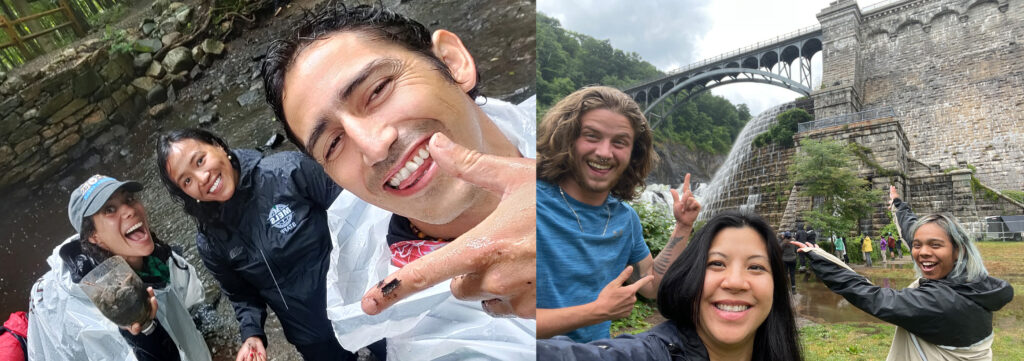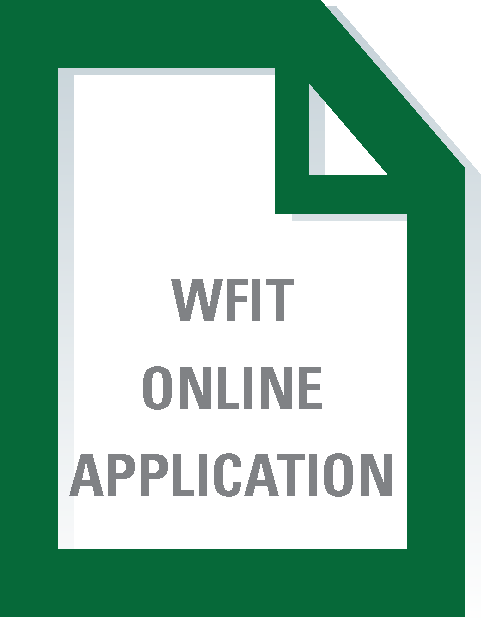Teachers Institute

last updated: 10/7/25

WFIT 2026 is for 4-8th grade teachers and non-formal educators. Complete the online application today. Deadline for submissions is Friday, May 15, 2026 by 5pm.
WFIT 2026 OVERVIEW
WHO:
Priority is for 4-8th grade teachers and non-formal educators working in municipalities wholly or partially within the East and West of Hudson Watersheds or the 5 boroughs of NYC. Educators in upstate consumer municipalities may be considered if space is available.
- Unsure about your eligibility? Email education@nycwatershed.org.
- Educators from the same school or organization are encouraged to apply.
WHAT:
5 days + 4 nights to:
- Earn approximately 30 CTLE credit hours
- Practice over 25 hands-on lessons about watersheds and forestry.
- Receive and get trained in Project Learning Tree and Project WET curricula.
- Go on field trips to discover first-hand how well-managed forests and farms protect water quality in the NYC Watershed.
- Explore indigenous ecological knowledge and classroom applications.
- Learn from inspiring peers & professionals and join an active community of practice of watershed educators.
- Develop an Action Plan for implementing watershed forestry themes into your teaching and learn about many programs and resources available to you.
- Access up to $500 of Teacher Assistance funding to implement your watershed forestry education plans.
WHEN:
Monday, July 20 – Friday, July 24, 2026
- Registration: 10-11am on Monday, July 20
- Departure: 4pm on Friday, July 24
WHERE:
Taconic Outdoor Education Center, Cold Spring, NY. Map here. Shuttle service will be provided to/from Cold Spring, NY Metro North Station on the first and last days of the Institute.
COST: FREE
- Meals, lodging and teaching resources provided free of charge.
- Funding provided by the NYC Department of Environmental Protection and the U.S. Forest Service.
HOW:
Apply online at https://www.surveymonkey.com/r/WFIT2026 by Friday, May 15, 2026, at 5pm.
CONTACT:
For more information email Tyler Van Fleet, East of Hudson Forestry Program Coordinator, at education@nycwatershed.org.
WFIT DETAILS
Mission
Eligibility
Deadlines and Cancellation Policy
Teacher’s Commitment
Learning Objectives
Institute Highlights
Location
Professional Development Credits
Teacher & Administrator Testimonials
WFIT History
The Watershed Forestry Institute for Teachers (WFIT) is a FREE multi-day day professional development educational program that immerses teachers in a hands-on study of New York City Watershed forestry, water quality science, and drinking water supply systems.
The mission of WFIT is to provide educators with the knowledge, inspiration and practices necessary to explore the connection between upstate watershed forests and downstate water quality with their students. Topics include water quality science, forest ecology and stewardship, sustainable development, engineering, New York history and community engagement.
Participation in the WFIT is also a pre-requisite for applying to WAC’s Green Connections program, which supports year-long partnerships between NYC and upstate watershed classrooms. The program involves a flexible 8-lesson curriculum, student pen pal exchanges, two shared field trips, and classroom visits.
Alternating each year, any formal or non-formal educator teaching either 4-8th or 6-12th grade students in New York City or the East or West of Hudson Watersheds is eligible to apply. Past WFIT participants may reapply once 5 years have passed since last attending WFIT.
– Unsure about your eligibility? Check out our online NYC Watershed boundary map or email education@nycwatershed.org.
– Teachers from the same team or school are strongly encouraged to apply.
Participation is limited to 30 teachers.
If a confirmed participant must cancel their participation, we ask that they do so at least 30 days prior to the WFIT so that an alternate applicant may be invited to attend in their place.
All WFIT participants must commit to the following:
1) Attend the entire program;
2) Develop and implement an Action Plan for incorporating select WFIT content into their teaching curriculum;
3) Share WFIT information with colleagues.
1) Investigate the environmental and social dimensions of forestry, water quality, and the drinking water supply system through visits to NYC Watershed forests, farms, water supply system and environmental education sites.
2) Engage in active learning experiences to increase awareness and enrich personal content knowledge about the connections between forests, water quality and people.
3) Practice, discuss and share a variety of curricula that can be used to advance effective teaching and learning about forestry and the NYC Watershed.
4) Develop an Action Plan for incorporating select WFIT content into your curriculum or programs.
– Discover NYC Watershed lands, waters, engineering and communities through presentations and field trips. Field trip sites may include: Sustainably managed Model Forests, portable saw mills, watershed rivers, streams, and farms, NYC drinking water reservoirs, waste water treatment plants, and environmental education centers.
– Practice many hands-on lessons.
– Get trained in Project Learning Tree and Project WET curricula, which are aligned to Common Core and Next Generation Science Standards.
– Receive heaps of reference materials about NYC watershed forestry topics for use with students.
– Join a growing community of practice of watershed educators from around the NYC Watershed region.
– Learn about other watershed-related education programs, such as the Green Connections Program, Watershed Forestry Field Trip Grants, Trees for Tribs tree plantings, NYC-DEP education programs, Catskills Watershed Corporation Education Grants, Trout in the Classroom, US Forest Service conservation education programs and more!
When public safety allows, the WFIT is held at various environmental education centers in and around the NYC Watershed regions. When possible, we try to host the program at sites where teachers can return with their students for day and/or overnight fieldtrips.
PROFESSIONAL DEVELOPMENT CREDITS
Earn CTLE credit hours through New York State Project Learning Tree. Exact number of credit hours varies by year. WAC staff will provide a certificate of completed professional development hours. No college credits are available at this time.
TEACHER AND ADMINISTRATOR TESTIMONIALS
– “WFIT is a great way to connect with other teachers, strengthen your knowledge of natural sciences, ecosystem management, and water systems and apply these lessons to your classroom.” 2021 WFIT teacher
– “WFIT inspired me to be excited about engaging students in stewardship. The fresh ideas and immersive activities have me thinking about how I can further develop my education style and programs.” 2019 WFIT teacher
– “I feel extremely prepared to take my lessons to the next level” 2018 WFIT teacher
– “This was one of the best experiences of my life.” 2017 non-formal educator
– “I do a lot of PDs and this is one of the best, most organized, informative and inspiring I have ever done.” – 2016 Teacher
– “I know so much more about forestry and water now. Not only will I apply it to my everyday life, but I’m also going to pass it onto my students. I feel incredibly educated and informed.” – 2015 Teacher
– “WFIT helps me share best practices with other teachers in urban and rural areas”. – 2015 Teacher
WFIT HISTORY AND FUNDING PARTNERS
The WAC Forestry Program – in partnership with the New York City Department of Environmental Protection (NYC DEP) and the USDA Forest Service – has developed a comprehensive approach to reaching teachers and students in the rural and urban communities that comprise the New York City watershed. This approach is characterized by four core efforts where information regarding forest stewardship and water quality is communicated. The Watershed Forestry Institute for Teachers (WFIT) forms the foundation of this approach by providing teachers with educational resources for use in their home classrooms.
The Watershed Forestry Institute for Teachers (WFIT) began in 1999 as a partnership between The Watershed Forestry Program of the Watershed Agricultural Council (WAC), the Catskill Forest Association, the USDA Forest Service, and the New York City Department of Environmental Protection (NYC DEP).
NYC DEP manages New York City’s water supply, providing more than one billion gallons of water each day to more than 9 million residents, including 8.4 million in New York City, and residents of Ulster, Orange, Putnam, and Westchester counties. This water comes from the Catskill, Delaware, and Croton watersheds that extend more than 125 miles from the City, and the system comprises 19 reservoirs, three controlled lakes, and numerous tunnels and aqueducts.
DEP has nearly 6,000 employees, including almost 1,000 scientists, engineers, surveyors, watershed maintainers and others professionals in the upstate watershed. In addition to its $68 million payroll and $157 million in annual taxes paid in upstate counties, NYC DEP has invested more than $1.5 billion in watershed protection programs—including partnership organizations such as the Catskill Watershed Corporation and the Watershed Agricultural Council—that support sustainable farming practices, environmentally sensitive economic development, and educational opportunities like the Watershed Forestry Institute for Teachers. In addition, NYC DEP has a robust capital program with over $14 billion in investments planned over the next 10 years that will create up to 3,000 construction-related jobs per year.


